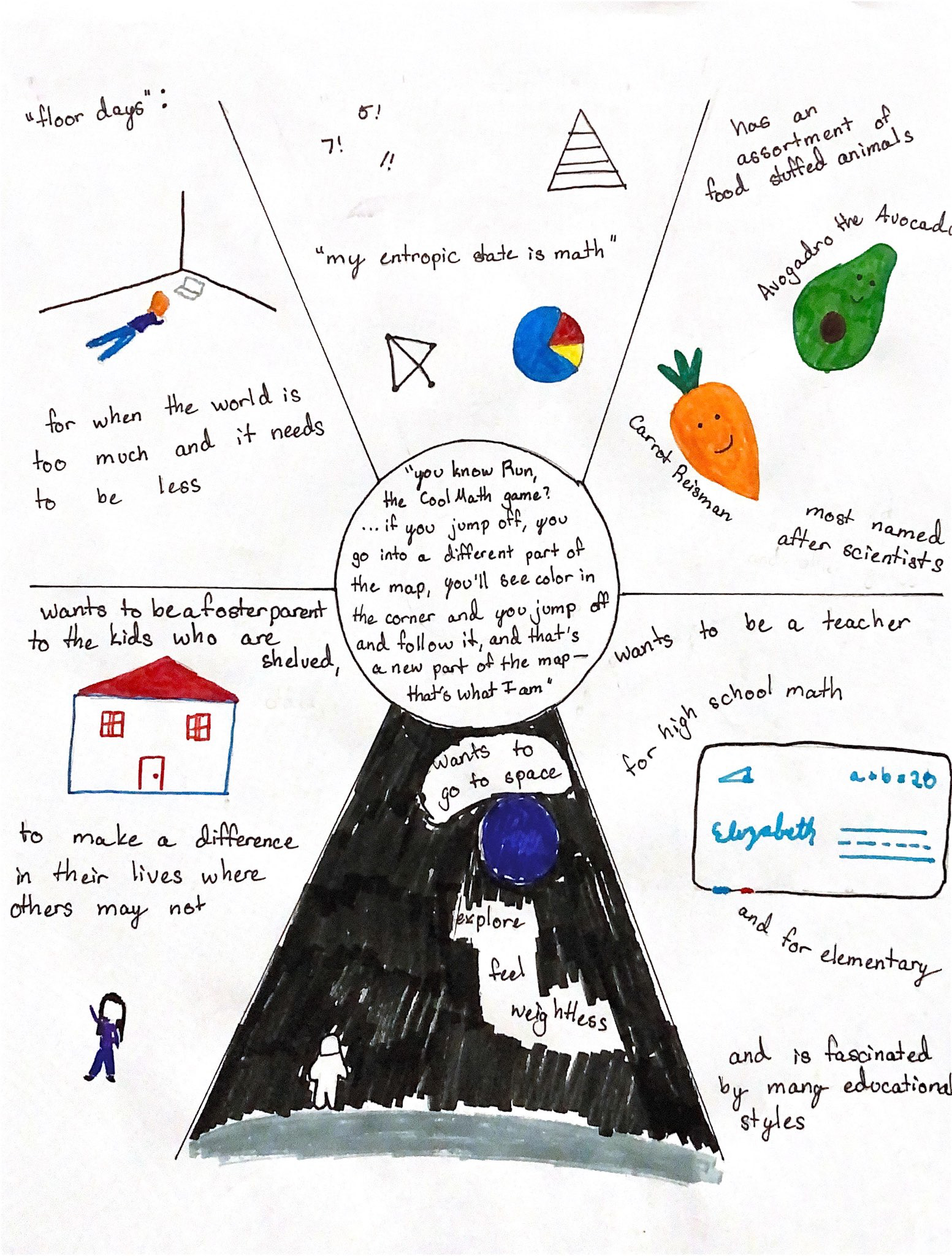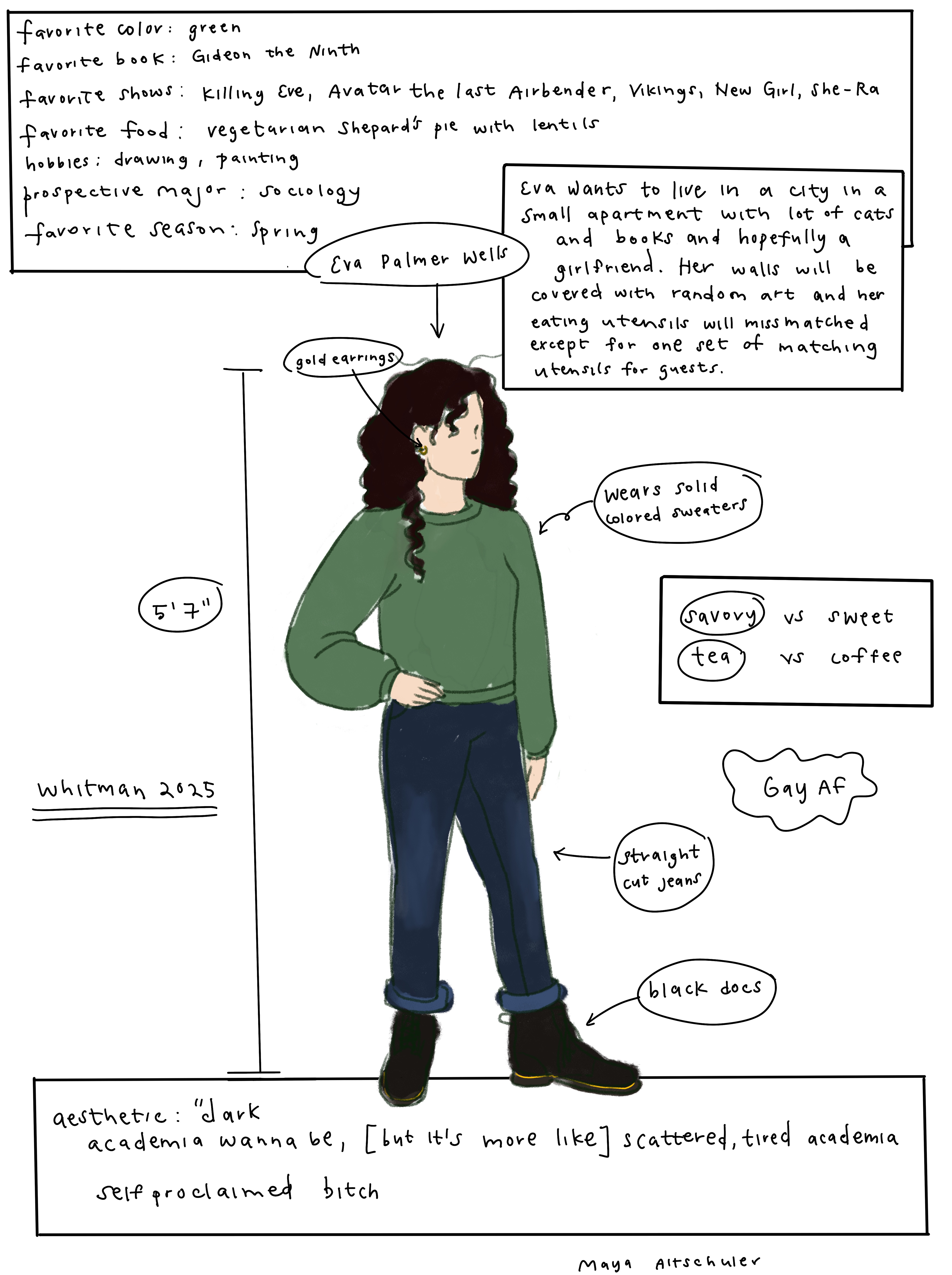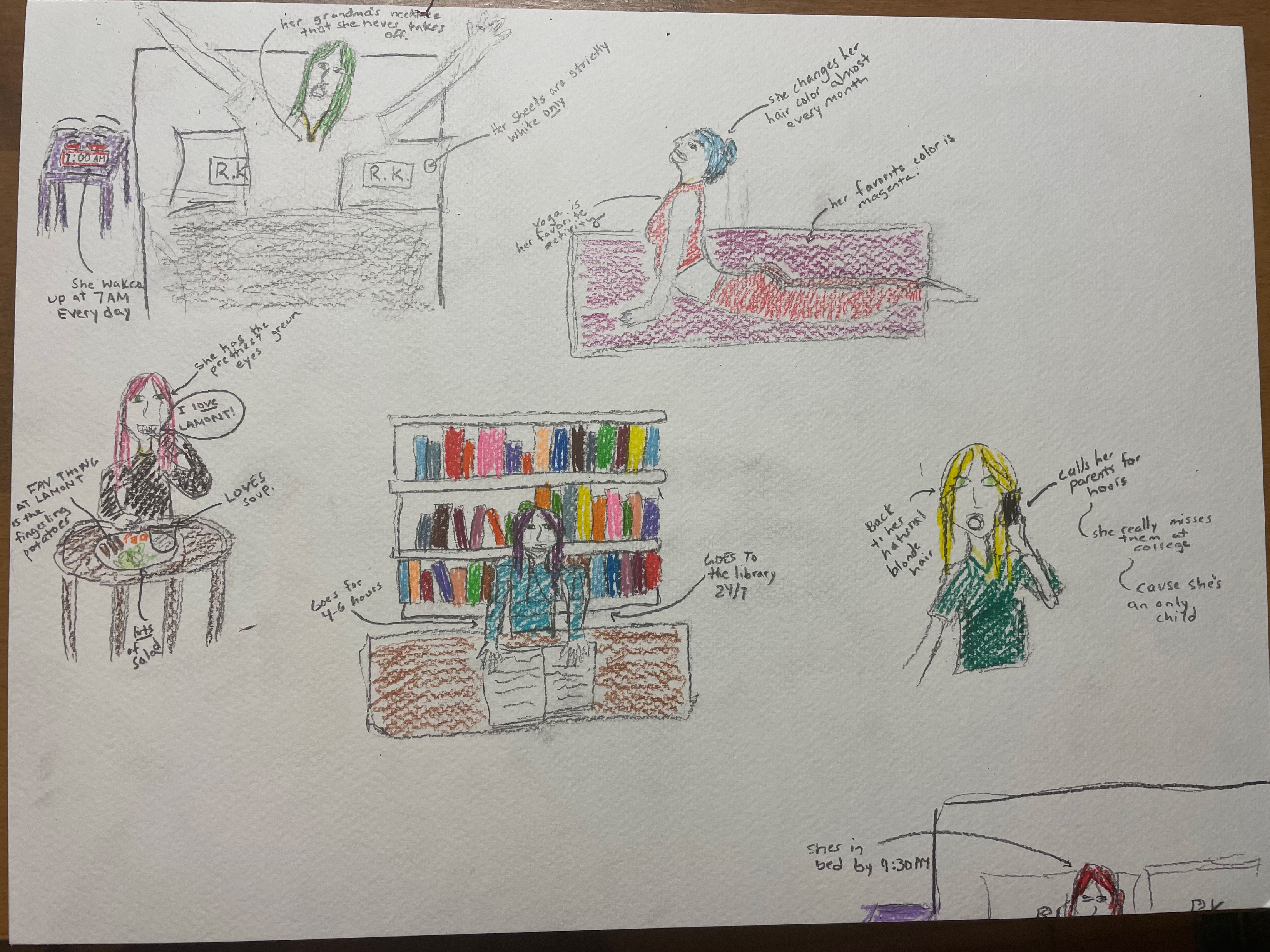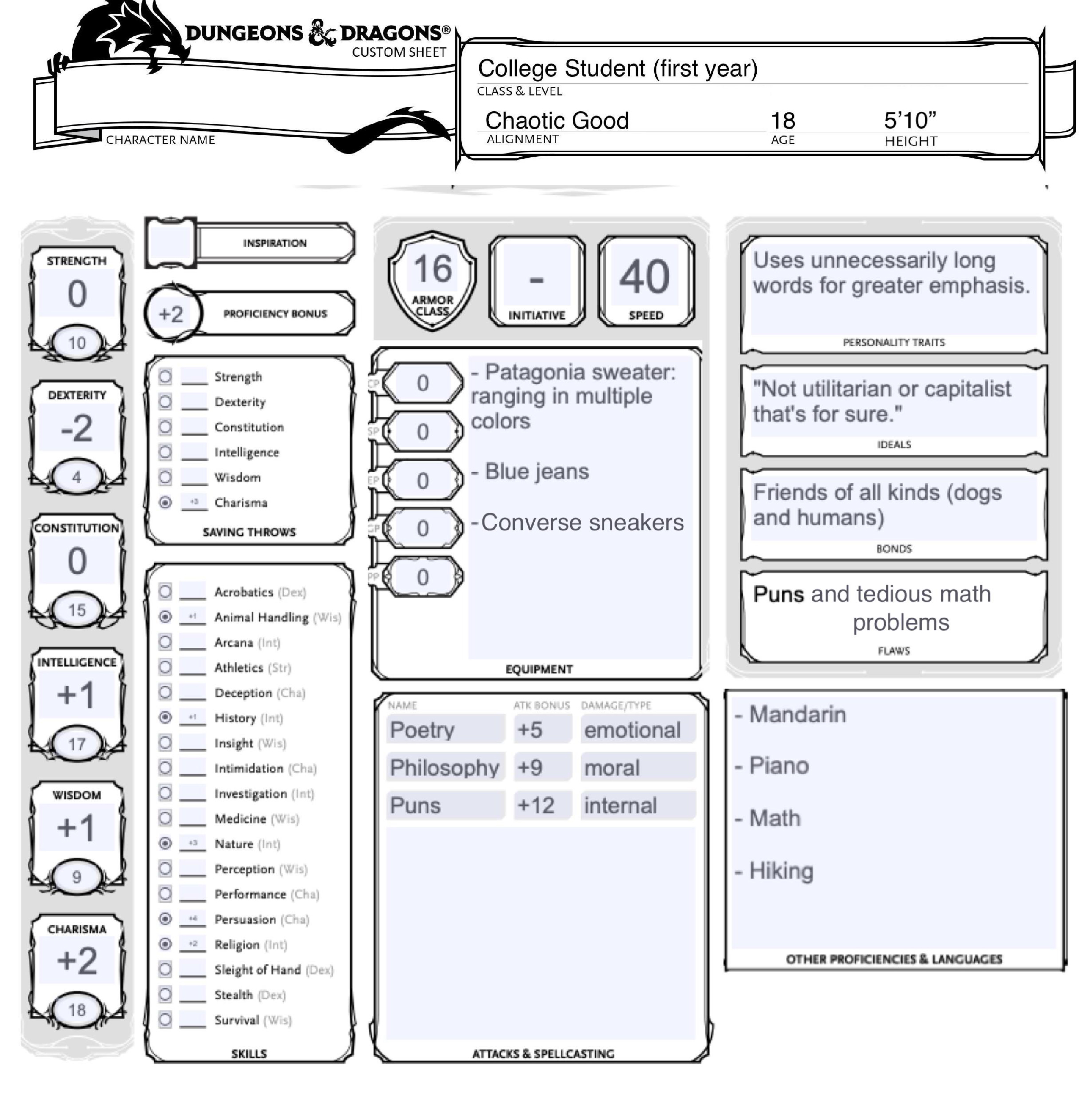Nonfiction: Profiles
Fiona, Anti-Capitalist Cardigan Queen
by Emma Solis ’23
(Note: Fiona’s pronouns are they/she, so they are loosely alternated in this profile.)
“Do you mind if I do this while we talk?” Fiona is covered in what looks like a crocheted Lorax ‘Thneed’, all soft rainbow pastels in abstract panels that don’t cohere into a garment just yet. Fiona is sewing together the panels with a large plastic needle and light green yarn. They unpick and redo their work at least twice over the course of our conversation. When she finally gets it so that the front and back of the oversized cardigan line up, she grins and celebrates.
Fiona tries to make anything they can. “If I really want something,” she reasons, “I’ll put in the work to make it. I made the pants I’m wearing now!” If that’s impossible, they buy second hand. Close to her entire life seems dedicated to alleviating or sweeping up the mess made of the world by history and capitalism. Last summer she volunteered teaching refugee children in a community garden near Atlanta, Georgia, her hometown, while doing remote outreach with a Massachusetts social program. She could do anything—she loves all subjects except for math and excelled in science in high school— but plans to be a social worker. It’s close to following in family footsteps: her parents are both Presbyterian pastors, community helpers and leaders in a sense, with a long line of male pastors on one side. But Fiona’s an atheist; it’s the one thing she and her parents disagree on. Open and understanding conversations ensue, with a stark lack of permanent resolution.
A born extrovert, they love to go out and dance, too. They like making connections with people they’ve seen in class or on the street, or striking up conversations with total strangers. She doesn’t even sweat if someone’s seen her let loose at a party: “I mean, you know me better now!” Surrounded by “superficial” friends, they’re working on forging deeper relationships. If she doesn’t plan to let go while going out, she’ll constantly mother her friends, which, apparently, nobody likes.
“You mean, like, you can’t stop yourself from mothering everyone?” I ask.
“Yeah,” they respond. “I’m overly maternal.”
Nina, carrying Sessions House’s bestest boy Babka, comes into the living room near the end of our talk and passes Babka over to Fiona. “He really likes you!” Nina croons as Babka lays on his back, in kitty heaven, Fiona scratching his neck and head. Then she answers one more question, gathers up her semi-pieced cardigan, and flies through the door, off to save the world some more.
Literal Enough
by Julian Hernandez ’24
Hailing from New York City, as many Smithies do, Lola and I crossing paths would have been unimaginable a decade ago. We have plenty in common: immigrant families, a love of college radio, a hate of disorganization, even an Irish high school history teacher who coached golf. What are the odds of that? Also, we are both are horrendous at math.
They are a writer (another similarity)– a poet, to be precise. “Reality is literal enough,” she tells me, so when writing, they seek to be immersed into fantasia, where a man can be a pear tree blossom and something holier than life. This imagination has to come from somewhere, not nostalgic Disney channel shows or glam boy bands, but books. Or perhaps, just the idea of books, because when I ask, she cannot give me a solid favorite. I shouldn’t ask a mother to pick a favorite child. Maybe bell hooks? James Baldwin? Even Zora Neale Hurston? Or whatever graces their hands next.
Some of the imagination must stem from their upbringing, as most things about us do. Lola had strict parents (yet another coincidence), hence why Disney was not a part of their childhood. We talk about our parents, how they hand down not only their genes but their tastes, peculiarities, and quirks. Often, we miss these tendencies, at least until they unravels in our futures. Small miracles, like realizing we are so similar to our parents, and trying to love them for their kinship to us, are what Lola tries to capture in their writing. They didn’t tell me this, but showing is better than telling. I am allowed the honor of reading their work, surgical in its preciseness, haunting as it stares me down. I don’t need to be told.
One thing that failed to be passed down was the language. We both are from Spanish-speaking families, but they never caught the tongue for it. Lola has tried, cried, and bled for it, but nothing sticks. English stuck; it is plastic and velvet and weightless in their hands. But Spanish slips through their fingers, even after years of study. It is such an easy and common want– learning another language– but its impossibility is especially acute for them. Not knowing their mother tongue is aggravating, embarrassing, desesperante, and there is nothing they can do. Nothing but make use of what she is gifted with instead.
Iris
by Mia Eisenberg ’24
From the moment she was born, Iris stunned everyone. She was born in central Philadelphia, four years after the end of World War I to Jewish immigrants from a small village in Western Russia. She grew up during the Great Depression in and out of foster care, graduated college while raising three boys, and drove to Washington to see Dr. Martin Luther King Jr. give his “I Have a Dream”speech.
Iris grew up in Philadelphia with four brothers and knew she had to fight to make her voice heard. She learned to dance between the sexist barriers that she faced, whilst maintaining her femininity. At a party where a family friend groped her to prove “how uptight Jewish women were,” she was forced to hold her cool while everyone else laughed. Iris got her Ph.D. in counseling, even though she had grown up running from landlords in the middle of the night because her family didn’t have the money to pay rent. Her passion for politics radiated throughout her life as she attended Vietnam War protests and watched as Barack Obama was inaugurated; she even requested her mail-in ballot at age 99, days after having a stroke.
Though her struggles were great, she never ceased to allow these large obstacles to influence her identity. Iris surprised everyone, she grew and thrived in a desolate environment and forever changed the biome around her.
Raul
by Tillie Schneiderman ’22
A self identified “ladies’ man,” Raul has been married four times. His first marriage was back in Madrid, Spain (where he was born) to a woman named Isabel. They were married for five years and never had a child, though Isabel desperately wanted children. They fell in love in graduate school where they were both studying literature and had a very passionate romance. The marriage ended abruptly when Isabel revealed that she was pregnant with another man’s child. She never revealed who the man was and Raul still does not know who he is. He suspects it was one of their professors, but I suspect that he is projecting because his next marriage was to one of his professors.
Raul had been pining after one of his professors during his marriage with Isabel and was quick to pursue her after the divorce. They eloped and were married for nine months before they separated. He described this divorce as “amicable” as it was a mutual decision. He was moving to Boston to write and she had an established career in Spain. He did not reveal her name as she is “a very famous writer.” After this marriage, Raul swore off women … for about six months. He began dating in Boston, but tried to not take anyone too seriously as he was exhausted from his past two relationships. He became close friends with a fellow writer he met named Susan. She was a lesbian, closeted at the time, and the two got along marvelously. Susan came from a massively homophobic family and was very uncomfortable with her sexuality at the time. Raul, on the other hand, realized he needed to become a citizen if he wanted to continue with his career. The two agreed to have a green card marriage, which pleased Susan’s family and allowed Raul to stay in the United States. They were married for just over four years and both continued to date other people during this time. They lived together and remain great friends to this day. Susan eventually discovered a vibrant and highly supportive queer community in Boston and ended up finding a girlfriend. The two became friends with another lesbian couple in the area, Meg and Jill, who happen to be my moms. Raul and Susan have been in my life for as long as I can remember and I consider them family.
Anyway, back to the Ladies’ Man himself. After he and Susan had put in enough time for him to be eligible for citizenship, Raul applied and became a US citizen, and the two got divorced. I had the privilege of attending Raul’s most recent wedding to his wife Joan. They have been married for seven years now (eight in May, he reminded me). Joan has a daughter my age and Raul has embraced her as his own, as her father is not in the picture. Being an animated and passionate Spanish man, Raul was very emotive during my interview with him. His stories about each wife came with different vocal inflections, different hand gestures and certainly different adjectives. He talks about Joan as if they have known each other forever, and he is certain in his belief that she is his soulmate. I feel very lucky to have been able to interview him as I had never considered to ask about his past marriages.
Stranger
by Sofia Catanzaro ’24
I met a stranger: 19, shagged hair, draped with silver jewelry, pouring over an inked page, scratching hatched shadow-work into a portrait of a splayed body. We walked for a time under my umbrella, listening to the sound of the pattering rain on the plastic and discussing Animal Crossing and riding a bike. In the library, both drawing as we speak in low voices, separated by a wall of pens and pencils and charcoal, we continued. I ask the questions:
Their perfect day? Waking up early, morning fog, pastries, outdoors, comfort, early to bed. Their favorite memories? Always in cars. Driving out to the field, sitting in the trunk with the back door open. I share my own: They are also always in cars, too. Windows down. That one song playing. Their life story? How they will die? Our similarities? Our sun and Venus signs. We deduce, by the end of the conversation, that we are both intuitive. We hate liars. We love to love. We like in-between seasons—fall and spring. Winter is a no-go. They tell me I’m too self critical, and that I am in love with music. I’m the one who should be doing the analyzing but I take it. We drink tea. We urge each other to restore forgotten passions. We discuss our parents. I learn they are a writer who no longer writes. The night crawls on. The library closes. The rain has stopped, and we walk out onto wet pavement. Avoiding puddles. Watching the streetlights reflect yellow on the slick.
The Aspiring RA
by Angel Ebebi (Mt. Holyoke)
Who aspires to be a resident assistant? Over the course of two hours, I interviewed four people applying to become RAs. All four of them answered this question in their own way.
The Aspiring RA is nervous. She stutters as she answers the interview questions. Her words come out quickly. Their rhythm matches the fast beat set by her interviewers’ typing. Her eyes flit around the room, unable to land long enough to find shelter. She glances at her interviewers, hoping to see kind eyes returning her gaze but faces disappointment instead. Their eyes are glued to their laptop screens. Recording her words takes priority over attending to her nervousness.
The Aspiring RA wants to help people. She already does. She teaches swimming. She volunteers. Friends count on her for a pick-me-up. Classmates text her to study together. Her younger siblings love her (although her brothers would never say that to her face).
The Aspiring RA is a leader and part of something bigger than herself. The swim team counts her as one of its most devoted members. The Student Government Association is made better by her input and enthusiasm for representing her community’s interests. She smiles at strangers and even weirder, she converses with them. For fun! She considers the entire college a part of her community.
The Aspiring RA does not remain nervous. Speaking about her accomplishments reminds her of who she is and why she is sitting in this small office. Her interviewers stumble over their words as they read the questions. All three of them laugh over their small mistakes, and the tension dissipates. The Aspiring RA’s voice deepens and slows as her confidence grows.
The Aspiring RA focuses on the bright side of taking care of others. She has not yet stepped into the role and felt the grounding touch of responsibility over a fellow student’s wellbeing. She is an optimist, focusing on the ways the job will benefit her and her residents. Her previous experiences and the RA training she’ll receive will help prepare her, but until she faces real situations, she’s untried and untested. Now and then, she acknowledges the sacrifices she might have to make. Her voice takes on a sing-song quality, the melody of a hypothetical that doesn’t know it’s a severe understatement.
The Aspiring RA is from a minority group. She is a woman. She is an ally. She is Black. She is African. She is American. Her sexuality remains undefined. She declares that her college is the right place for her, in part because she gets to engage with others. Some of them share her identities, others do not. Either way, she is surrounded by interesting people.
The Aspiring RA is ultimately a person. Her essence cannot be captured in a 25 minute job interview. The Aspiring RAs are people, their diversity and potential cannot be contained in any job description.
And who is the RA? The RA gets nervous, tries to help people, and leads when the situation calls for it. She rises to the occasion regardless of how confident she feels. At a PWI, she is hardly ever the majority. Her time as an RA showed her many ways to help people and taught her the importance of taking care of herself. The RA reflects on the interviews and realizes – she should write about this for her writing class.



